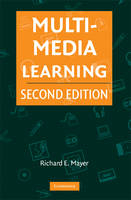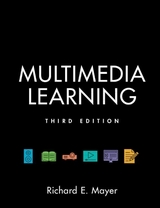
Multimedia Learning
Cambridge University Press (Verlag)
978-0-521-73535-3 (ISBN)
- Titel erscheint in neuer Auflage
- Artikel merken
Although verbal learning offers a powerful tool, Mayer explores ways of going beyond the purely verbal. Recent advances in graphics technology and information technology have prompted new efforts to understand the potential of multimedia learning as a means of promoting human understanding. In this second edition, Mayer includes double the number of experimental comparisons, 6 new principles - signalling, segmenting, pertaining, personalization, voice and image principles. The 12 principles of multimedia instructional design have been reorganized into three sections - reducing extraneous processing, managing essential processing and fostering generative processing. Finally an indication of the maturity of the field is that the second edition highlights boundary conditions for each principle research-based constraints on when a principle is likely or not likely to apply. The boundary conditions are interpreted in terms of the cognitive theory of multimedia learning, and help to enrich theories of multimedia learning.
Richard E. Mayer is Professor of Psychology at the University of California, Santa Barbara, where he has served since 1975. He is the author of Multimedia Learning (Cambridge University Press, 2001) and editor of The Cambridge Handbook of Multimedia Learning (Cambridge University Press, 2005). In 2008 he received the American Psychological Association's Distinguished Contributions of Applications of Psychology to Education and Training Award.
Preface; Part I. Introduction to Multimedia Learning: 1. The promise of multimedia learning; 2. Science of instruction: determining what works in multimedia learning; 3. Science of learning: determining how multimedia learning works; Part II. Principles for Reducing Extraneous Processing in Multimedia Learning: 4. Coherence principle; 5. Signaling principle; 6. Redundancy principle; 7. Spatial contiguity principle; 8. Temporal contiguity principle; Part III. Principles for Managing Essential Processing in Multimedia Learning: 9. Segmenting principle; 10. Pretraining principle; 11. Modality principle; Part IV. Principles for Fostering Generative Processing: 12. Multimedia principle; 13. Personalization, voice, and image principles; Part V. Conclusion: 14. Principles of multimedia design; References.
| Erscheint lt. Verlag | 12.1.2009 |
|---|---|
| Zusatzinfo | 49 Tables, unspecified |
| Verlagsort | Cambridge |
| Sprache | englisch |
| Maße | 152 x 228 mm |
| Gewicht | 510 g |
| Themenwelt | Geisteswissenschaften ► Psychologie ► Pädagogische Psychologie |
| ISBN-10 | 0-521-73535-1 / 0521735351 |
| ISBN-13 | 978-0-521-73535-3 / 9780521735353 |
| Zustand | Neuware |
| Informationen gemäß Produktsicherheitsverordnung (GPSR) | |
| Haben Sie eine Frage zum Produkt? |
aus dem Bereich



